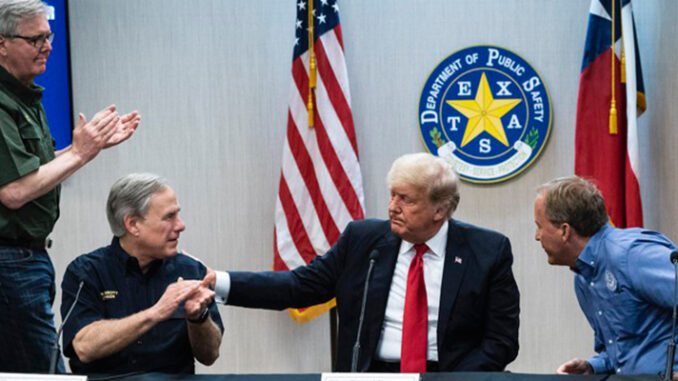
Republican obstruction not only creates chaos at the border but also undermines the values and principles that the United States upholds as a nation of immigrants.
by Alex Gonzalez
The end of “Title 42” was expected to bring chaos to the US-Mexico border region. However, on the first day after its end, the border appears to be under control. Any perceived “chaos” related to immigration is actually a direct result of Republicans’ refusal to support comprehensive immigration reform.
The issue of immigration has long been a contentious topic in the United States, particularly along the US-Mexico border. One major factor contributing to the chaos at the border is the steadfast refusal of Republicans to pass a comprehensive immigration bill. The detrimental consequences of such obstructionist behavior and how it has led to the creation of chaos and a lack of effective immigration policy at the US-Mexico border.
By repeatedly blocking comprehensive immigration reform, Republicans have hindered progress toward developing a cohesive and sustainable immigration system. This refusal to engage in meaningful dialogue and find common ground has resulted in a vacuum of policy, leaving the border vulnerable to chaos and mismanagement.
The absence of a comprehensive immigration bill has perpetuated a cycle of uncertainty and confusion. Without clear guidelines and a streamlined process, both migrants seeking asylum and border enforcement officials are left in a state of limbo, exacerbating tensions and generating chaos at the border.
Republicans’ failure to support a comprehensive immigration reform has contributed to the backlog of cases and lengthy processing times for individuals seeking legal status. This backlog strains resources, increases the risk of human rights violations, and fuels the perception of a border in disarray.
A comprehensive immigration bill would address key issues such as border security, pathways to citizenship, and visa reforms. Republicans’ refusal to support such legislation not only hampers efforts to effectively secure the border but also prevents meaningful reforms that would facilitate legal migration and contribute to economic growth.
Furthermore, the lack of a comprehensive immigration bill has forced undocumented immigrants into the shadows. Without a clear path to legal status, they are vulnerable to exploitation, human trafficking, and other criminal activities. This chaotic situation could be mitigated through legislative action, but Republicans have repeatedly stood in the way.
In addition to perpetuating chaos, the Republican obstruction also hinders diplomatic efforts with Mexico and other countries in the region. A comprehensive immigration bill would allow for better coordination and cooperation in managing migration flows, addressing root causes, and promoting regional stability.
The absence of a comprehensive immigration bill also obstructs the implementation of effective border control measures. With limited resources and no clear directives, border enforcement agencies struggle to address the complex challenges posed by illegal crossings, drug smuggling, and human trafficking.
Republican obstruction not only creates chaos at the border but also undermines the values and principles that the United States upholds as a nation of immigrants. By refusing to pass comprehensive immigration reform, Republicans perpetuate a system that fails to recognize the contributions and potential of immigrants, leaving families separated and lives in limbo.
Moreover, the lack of a comprehensive immigration bill prevents the establishment of a robust guest worker program, which could help address labor shortages in various sectors of the economy. This shortsightedness undermines economic growth and denies opportunities for both American workers and aspiring immigrants.
In both 2006 and 2013, comprehensive immigration bills that could have allocated an additional $40 billion in resources for border security were thwarted by Republicans in the House. These bills enjoyed support from President George W. Bush and a bipartisan group known as the “Gang of 8” in the US Senate in 2013. However, since then, the emphasis of Republican-supported immigration bills has predominantly centered around enforcement measures and the construction of walls, serving as mere symbolic gestures to cater to the party’s base.
Over the past 20 years, much of the Republican effort regarding immigration has been focused on enforcement measures and the construction of physical barriers, such as walls, along the US-Mexico border. However, these approaches alone do not effectively address the labor needs of our nation. While border security is an important aspect of immigration policy, it is equally crucial to recognize and address the economic realities and labor demands that drive migration.
Enforcement measures and walls may deter or delay unauthorized border crossings, but they fail to tackle the underlying causes of migration. The United States relies on immigrant labor in various industries, including agriculture, construction, and hospitality. Neglecting to address the labor needs and create viable pathways for legal immigration can result in labor shortages, economic disruptions, and an exploitative environment for both immigrants and native workers.
To create a comprehensive immigration system, it is imperative to strike a balance between effective border security and addressing the labor needs of our nation. This requires developing mechanisms that facilitate legal immigration channels, such as guest worker programs and visa reforms, which can provide a regulated and orderly flow of labor while protecting the rights and well-being of immigrant workers. By recognizing the importance of labor needs and embracing a holistic approach, we can move towards a more sustainable and fair immigration policy that benefits both the nation and those seeking better opportunities within its borders.
The chaos at the US-Mexico border can be attributed, in large part, to the persistent refusal of Republicans to pass a comprehensive immigration bill. Their obstructionist stance has hindered progress, perpetuated uncertainty, and prevented the implementation of effective border control measures. It is crucial that Republicans engage in constructive dialogue and work towards bipartisan solutions to address the immigration challenges faced by the nation. Only through comprehensive immigration reform can we establish a fair, efficient, and humane immigration system that upholds American values while effectively managing the border.
.
Alex Gonzalez is a political Analyst, Founder of Latino Public Policy Foundation (LPPF), and Political Director for Latinos Ready To Vote. Comments to [email protected] or @AlexGonzTXCA
